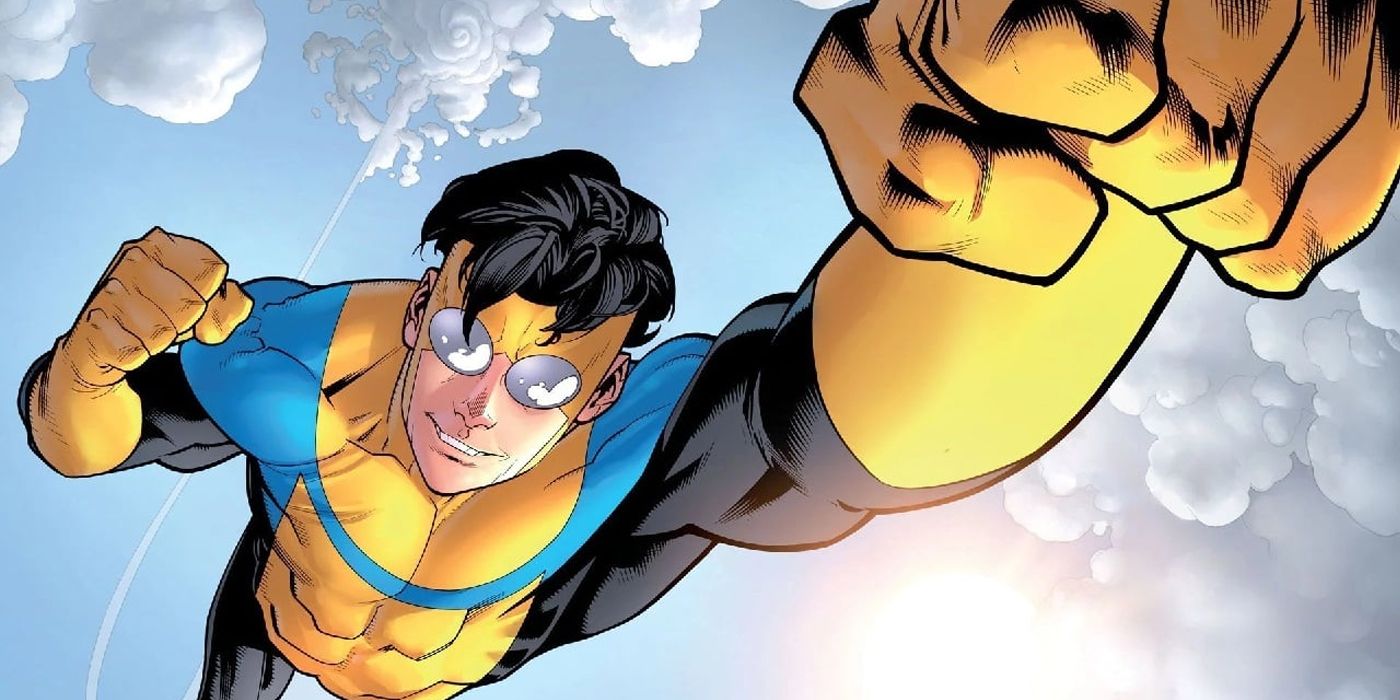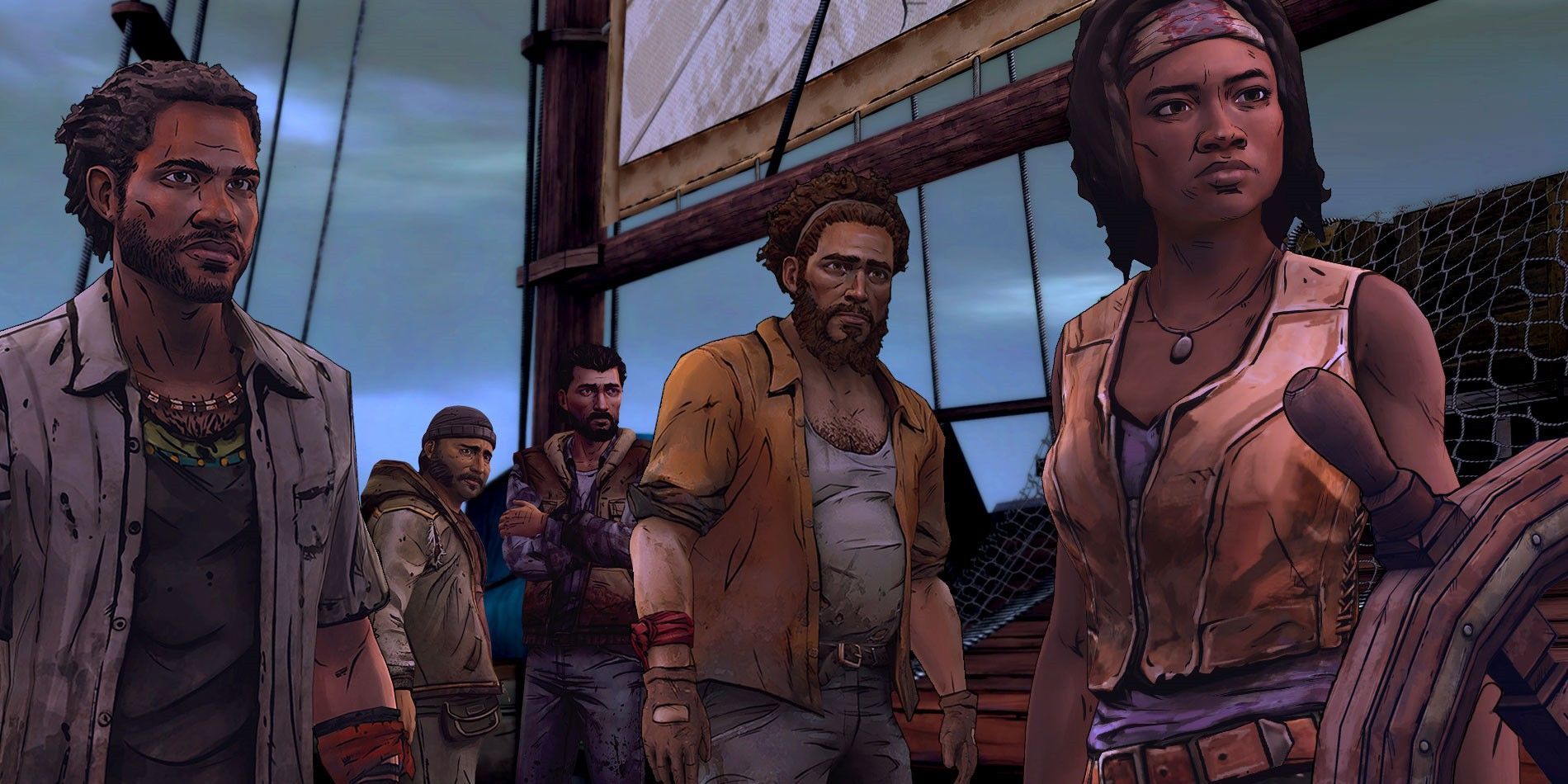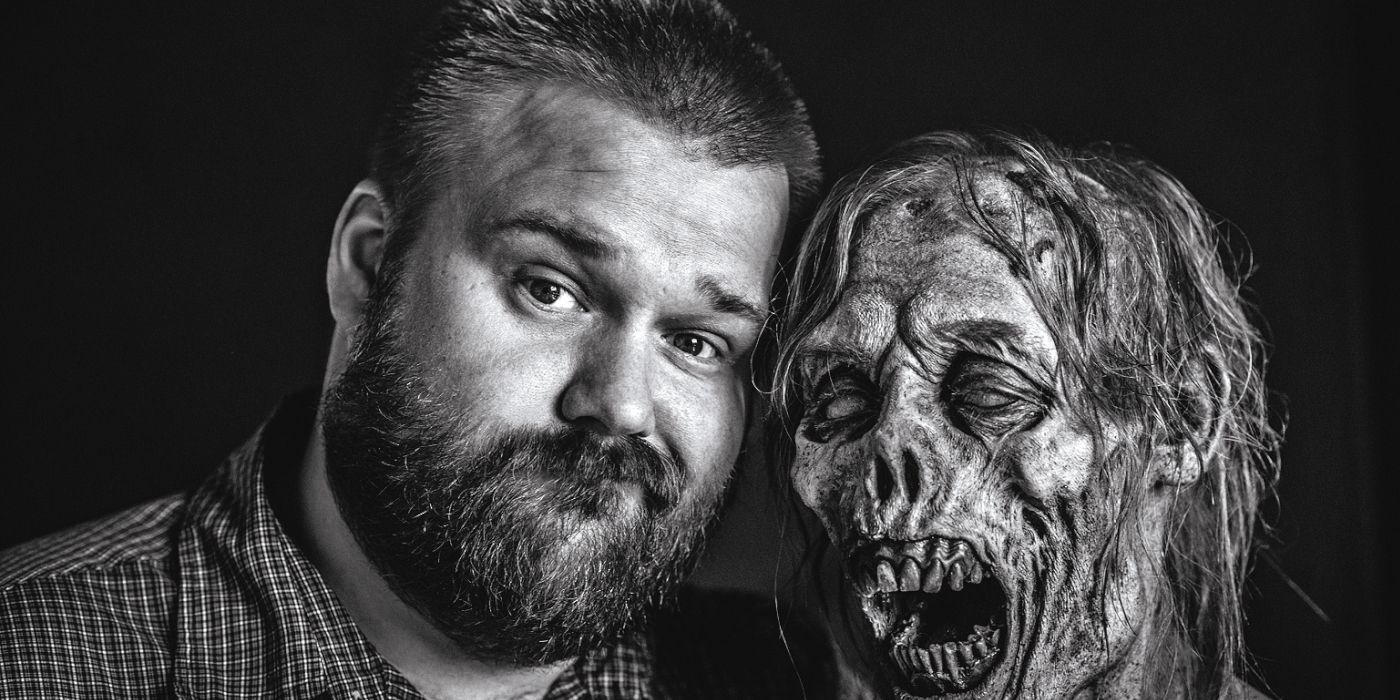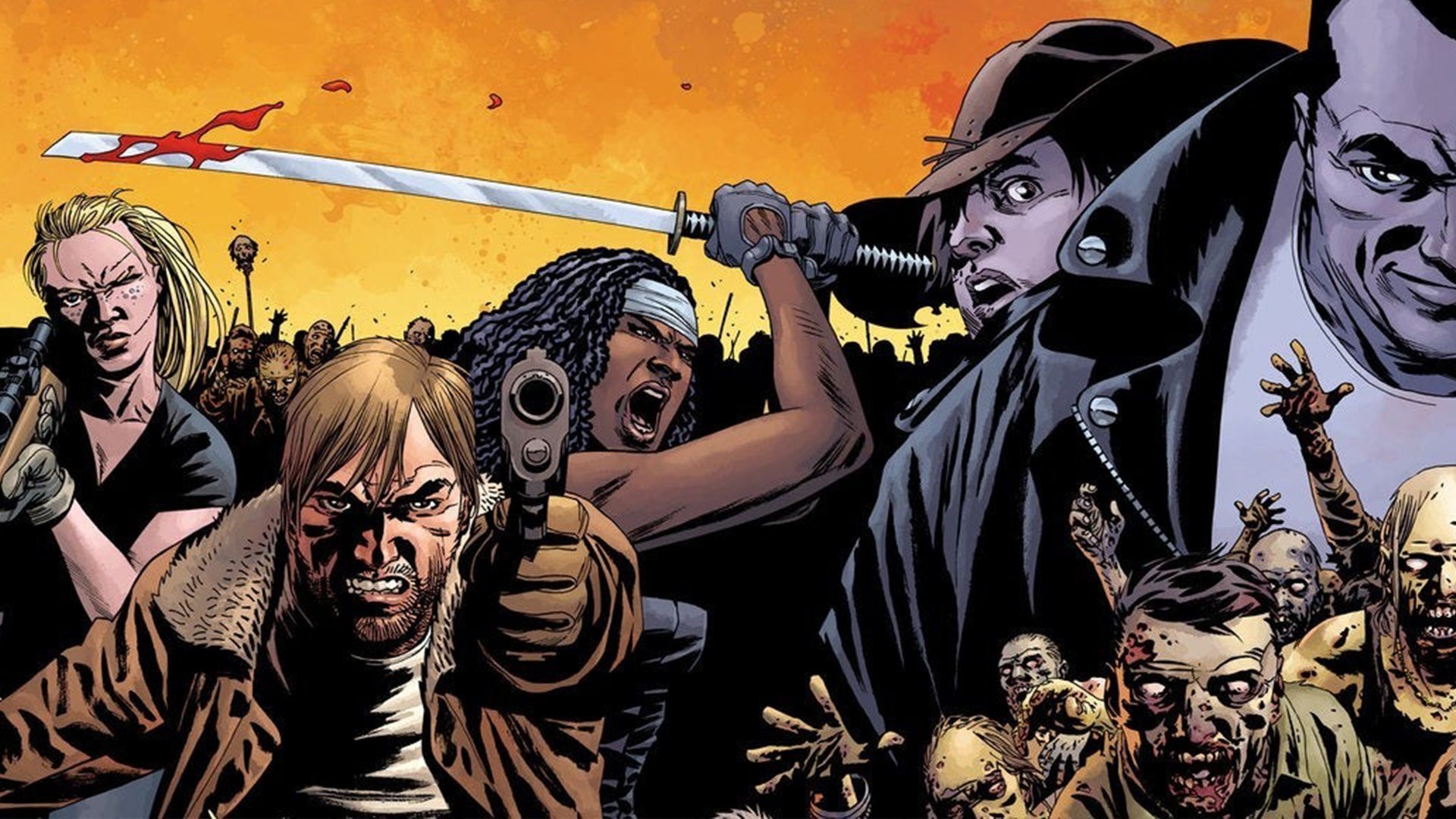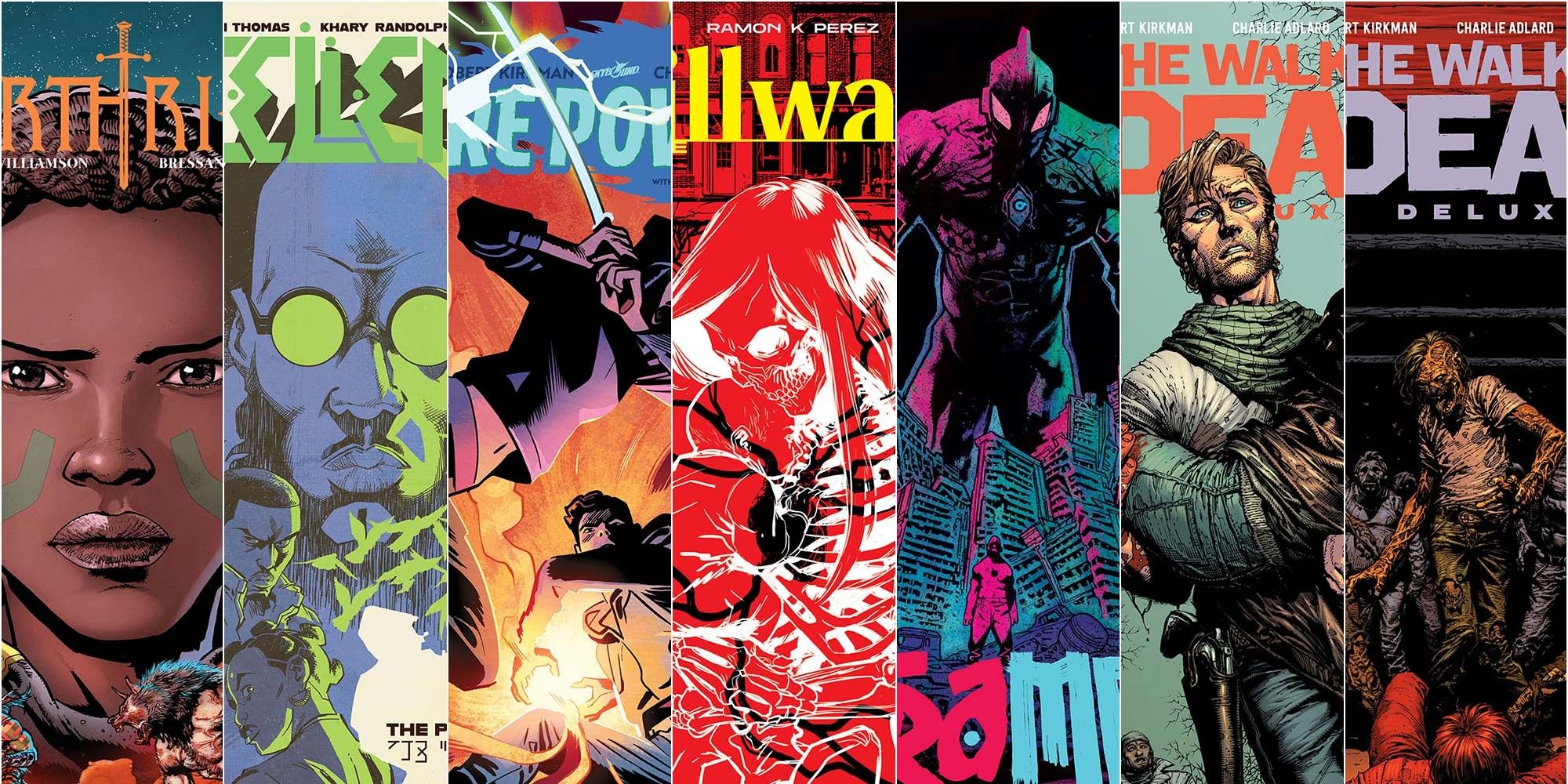Skybound Entertainment is the driving force behind some of the most innovative genre properties in television, comics, and games, including Invincible and The Walking Dead. Founded in 2013 by Robert Kirkman and David Alpert, Skybound Entertainment continues to create content across countless platforms and has expanded to include virtual reality and an in-house digital studio. Skybound has worked hard to cultivate a passionate fan base and has found a new way for fans to invest in the properties and creators they love.
Fans can now become shareholders in Skybound Entertainment, giving them an even stronger voice than ever before. Fans have already invested time, energy, and money into these beloved properties by collecting Invincible and The Walking Dead comics, video games, and collectibles. By becoming a shareholder fans can see a return on that investment and a voice that will be heard. Skybound Entertainment is on the cutting edge as a multimedia company, and this step allows fans to be a part of its growth in an even more substantial way.
Screen Rant spoke with CEO and co-founder David Alpert and co-chairman Jon Goldman. Alpert and Goldman explain what it means for fans to become shareholders in Skybound. They also break down the importance of immersive storytelling and how the company is built around this idea. They also give new insight into Renfield and The Walking Dead. Alpert shares what it is like to work with Robert Kirkman.
David Alpert & Jon Goldman On Skybound Entertainment Crowd Equity Financing
Screen Rant: The first question I have for you guys is, what does it mean for Skybound to be going public?
David Alpert: Well, so this is not a traditional IPO, meaning we're not floating on a public stock market. What we've done is called a Regulation A offering, which allows us to open up the number of investors that we have, and so we can take more investors in from the public, but we're still remaining a private entity. The reason why we're doing this is in large part because we think of ourselves as a different type of content company.
Everything else up till now, even disruptive companies like Netflix, it's all been about a specific type of content. You subscribe to Netflix because you want to watch TV, maybe some movies. You go to a theater because you want to watch a film. You watch television to watch television. We want to connect IP and content with fans. If you love that content, if you love Walking Dead, you love Invincible, and you want to play the game, read the comic, watch the show, we want to be the thing that connects you to your fandom.
Part of that is having great creators like Robert Kirkman and Travis Beacham and Ryan Ridley sort of in our stable that we work with and then connecting them with those fans. We have the great creators, we've made the great content, and now the goal through this Regulation A is bring those fans into our ecosystem, have them actually be our partners. Having them participate, not just enjoy the content, but have them actually get a financial return. Our success is their success, and that's really the relationship that we want to build.
I love that. I love that. Now, can you talk to me about Skybound's Wheel of Awesome method?
David Alpert: Oh, yes. The Wheel of Awesome, it's designed from the beginning, because we take a great creator with a piece of IP, and we put them at the center of our business model. And then, the idea is really wherever that creator wants to go, and an audience is willing to take them, we'll go. So, if they want to do a comic, if they want to do a podcast, if they want to do a video game, if they want to do a board game, if they want to do a live event, if they want to make merchandise.
Whatever they want to do, we'll figure it out. If somebody wants to figure out, how do you make an interactive story and put it on a bottle of wine, we'll do that. And we've done that, and we've done that successfully. So, it's really about whatever that creator is willing and wanting to do, and the audience is there to sort of support it. We have business units and teams that will make us roll that idea all the way through to completion.
That already separates you guys from a lot of your other competitors. You guys are developing properties across all mediums, with some crossing mediums, like The Walking Dead and Invincible. How does cross-platform storytelling elevate the IP?
David Alpert: Well, I think if we go back, the normal way in which people thought about, they thought about everything as a pyramid. You start with your sort of linchpin IP. You say, "I'm going to make a movie, and then we're going to do a video game, and then we're going to do a comic book." And they used to call that derivatives, and be like, "Oh, we're going to make derivative media, or derivative product." We hate that term. We think that term is very out of date. Does not work. We think it's actually anti-creative. And so we think of, one, the reason our Wheel of Awesome is a wheel, there is no priority. There is no hierarchy. Everything is primary.
It's not our property, but I love Game of Thrones. I've read every book, I've watched every episode, I bought all their whiskey, and I played their bad game. But if I played their bad game first, right, I wouldn't read the books, and I wouldn't watch the show, and I wouldn't buy the expensive whiskey. So, for us, we want to make everything primary, and the only way to really do that is you have to think about it as a cohesive universe. One, every access point might be the first access point, so you have to think about it that way. The other part is you can't tell that same story again and again and again. You watch Indiana Jones, and then you watch him run away from the boulder, you don't want to be doing the exact same thing in the video game. You want the world to expand.
What we love, if you look at The Walking Dead, some people's favorite character is Rick, and Rick comes from the comic. Some people's favorite character is Darryl, and Darryl's from the show. But a lot of people's favorite character is Clementine, and Clementine comes from our first video game. And the fact that Clem is out there, the fact that Darryl's out there, the fact that Rick is out there, we love that, that people have their own fandom connect to different mediums, and we feel like that's a perfect example of how you can do some interesting world building.
Jon Goldman: I was going to say, you may or may not be aware that Clem is now featured in a young adult comic book, which has just really blown up. And when you ask how it's done compared to a big company where it starts in a PowerPoint and, "Let's do a comic book and let's do this and that," the comic book of Clem wasn't ready until we are ready to do it, maybe eight years later, and then when we do it, it's one of the biggest YA comics ever.
I love that you mentioned Clem. At that time when the Telltale game was coming out, I wasn't a big gamer, but that was something that I played, chapter by chapter, like clockwork. That game was so immersive. reminded me a lot of Choose Your Own Adventure, which was easy enough gameplay for me, but the story was just so, so good. I absolutely loved it.
Jon Goldman: As an aside on that, the issue is it wasn't coming out like clockwork from Telltale, and so we had to take the license back and start producing it ourselves, which is part of our ethos of supporting the fan. That means we moved from licensor to publisher, and we asked, "Why are we doing a Reg A financing with our fans?" It's because we want to be able to do more of that publishing ourselves so that we don't give this valuable IP to other people who may not let it come out on the schedule that fans want, so it all kind of fits together.
Right. Just you guys are saying, cohesive storytelling across all forms in-house. I really love that idea. Now, you guys have a lot of original content coming out all the time. What's the process for creators to begin working with you, and what are you guys looking for in a creator?
David Alpert: I think in general, we're looking for creators who are exploring new spaces. People ask, why do we think Walking Dead was so successful? So, one, we had a great story. You got to start with that. If you don't have a great story, you got nothing. But if you have a great story, the thing we had with Walking Dead, no one had done serialized horror on TV. We know that people loved horror. Horror movies have done great forever. Horror books have done great forever. But no one had told serialized horror on television.
We've seen episodic horror, we've seen goofy horror, we've never seen serialized, real storytelling going from episode to episode. We think that was one of the reasons why we were able to get the success that we did. Same thing with Game of Thrones. You had never seen fantasy treated seriously. You had seen things like Hercules and Xena that had a camp element to it, but no one had said, "Hey, these are real characters doing real things with real stakes, and we're going to treat them that way."
So, for us, we're always looking for where are those opportunities to explore some part of the canon that we haven't really lived in. I think the same thing happened for us with Invincible, which is we took Invincible, we've seen plenty of superhero things, we've seen plenty of animated things, we've seen dramatic superhero things, but we've never seen that after-school type of superhero experience treated as like, "Hey, no, this is real characters, real stakes." But the violence that we've come to expect inside of that combination, and treating it as an hour. Literally, just by making that show an hour, we're signaling something to the fan, like, "Hey, this is not the after-school show. It's reminiscent of, but we're doing something different." We always like pushing it in those directions.
Similarly, we have Renfield coming up in April, and the thing for us with Renfield was you've seen plenty of Dracula stories. There's been a million Dracula stories. I guarantee you have never seen this take on Dracula, and the notion that Renfield and Dracula are in a co-dependence relationship and that Dracula's the ultimate narcissist. It's one of those things that once you hear it, you're like, "Ah, of course." You call somebody a psychic vampire at work. You're like, "Oh, no, no. He is not only a psychic vampire, he's the vampire." You play those dynamics. I don't think we've ever really seen that. I think it's always those intersections of something familiar but done in a completely different way that we love.
You have no idea how much I'm looking forward to Renfield, by the way. It looks brilliant. It looks so good. Now, what do you guys consider the X factor that separates a good concept from a production that you guys need to make?
David Alpert: There's plenty of companies out there that are great at what we call fast follow. The Matrix comes out, then all of a sudden you saw a bunch of people wearing black leather, doing kung fu, right? We're not good at that. We don't know how to do the second thing. We always want to be the company that's doing something initially and first and a little bit different.
I think that's where we sort of add the extra value. Honestly, the other part is, I would say, if it makes you a little bit uncomfortable the first time that you read it or look at it or hear it, that's also something for us where it's like, "Oh, that's..." If it's like, "Oh, I know exactly what that is. Oh, that's fun," no. It has to be something that really stands out.
Jon Goldman: Invincible was a hit comic almost 20 years ago, and it took a long time to sell it as a TV show. And again, one of the reasons we're partnering with our fans is that they knew 20 years ago. We have a lot of conviction and knowledge about what our fans like, and rather than pitching an executive at a streamer who may change jobs midway through, partnering with our fans, we can get stuff done more quickly. I mean, there is art to it, but there's a lot of stuff that's also pretty obvious, and that we've had to spend a lot of time convincing other executives about the obvious. When we partner with our fans, we can move forward more quickly.
So, full transparency, I'm a little bit of a novice when it comes to companies going from private to public. And if anything, how does the strategy change with Skybound going public, if at all?
Jon Goldman: Again, it's not public. It's a crowd equity financing that allows us to bring regular people in. As you know, our entire economic system, it's like a form of crony capitalism, that big institutions with lots of money get into the best deals, and the individual investor doesn't get in for years later when it's more expensive. This allows regular people to invest, because the minimum share is only 500 bucks. So, not cheap, not nothing, but it's not millions of dollars.
We now have owners in the company, roughly 5,000 now, who will care about everything we do, will probably post stuff on social media. If you look at their public pages, they already tell us their opinion about Stephen Colbert and Chronicles of Amber and this, that and the other thing. That's what we want. They'll help guide us to success through their fandom.
David Alpert: We've always seen this. We have these people that have been fans of ours since day one that showed up at Comic Con to tell us that they love the show, love the comics, love the other stuff. We've had people come to us that we've now known for years, and they have been part of our success. We cannot be successful if people don't buy and watch and tell their friends.
The goal here is, just like when we license out a game or license out a show and that company makes a ton of money, it's good for us, too. We want the same thing for our fans. We want them to have access to those deals and have access to our success so that we can both win. We think that also unlocks huge opportunities.
We think it's a great equalizer, but really unlocks opportunities to do things that again, it took us 20 years, it took us 17 to 18 years to get Invincible on the air. We knew we had the special thing there. Our fans, by being financially part of us, we could actually get to that thing much, much sooner, because they know how great the things we are working on.
Jon Goldman: And also, it's a different level of respect for fans. Most companies, your basic job is to sell stuff to your fans. We know that they're going to buy our stuff anyway, but as long as they're buying it, why not let them share in the business success too and be our partners, not just a pocketbook to go after?
I love that, because it feels so grassroots to your fans directly, and it also gives them stakes for when they're buying properties that they're investing time into that they can get a return on. I think that's such a cool idea. Now you guys have many projects coming out like Invincible and Renfield, but you have a ton of projects in development. Can you talk to me about some of these projects and what the development process looks like for you guys?
David Alpert: Sure. I mean, it's interesting. When we sit down with a creator, the creator will tell us, like, "Hey, here's what I'm thinking." Sometimes, what happens is we have a game creator who comes in, and we expect that they're going to pitch us a game. But they're like, "No, no, no. I have a novel I want to write." Or, "I have a comic I'd like to write." Sometimes a comic book creator comes in, is like, "I have a TV show I want to do." When we sit down with the creator, we really let them tell us what it is that they want to do first. And then, depending on where we anchor that idea, that IP, that sort of informs what the development process will be.
So, if it's for a game, we have to figure out, like, "Okay, what are the unique mechanics? What are the systems? What are the requirements?" If it's a movie or TV show, it's like, "Is it live action or is it animated? What's the level of violence? What's the budget?" There's a whole bunch of scoping that then goes into it, and then we'll start working on the individual details to figure out, like, "Okay, what is our individual plan to get this thing up and running?"
That's really where it goes, but it really starts with the meeting of the minds and figuring out, like, "Okay, this is a world, but the first point of encounter that we're going to develop is going to be this, right?" And then it's figuring out, like, "Okay, how do we get that up and running?" And inevitably, we need partners. If you're a comic book writer, you need an artist, you need an inker, you need a letterer, so we have to build out that team. If it's a video game, we have to figure out who's going to be the developer, how do we do it, what's the platforms? So, we always have to figure out, how do we build the team? How do we put the band back together each and every time?
Yeah, I kind of want to expand on that a little bit, because I love what you guys have done with The Walking Dead. I've been a longtime fan. I think I have the first 53 issues, single issues, and then I switched over to the trades, then I switched over to the omnibuses, so I have a ton of Walking Dead stuff, just to keep track of all of it. I love what you guys done with that. You guys really flesh out the world with its spinoffs, exploring different perspectives. Can you talk a little bit about the development process behind expanding IPs versus coming up with entirely new IPs?
David Alpert: Yeah, I mean, I think one of the things for us is, okay, I'll use The Walking Dead, since you're familiar with it, and you know the game. When we had The Walking Dead, the comic came out in 2003 and started taking off. We knew we had something special, so when we looked to do the TV show, the idea was Robert had a very specific vision about how it was going to be done. There's a certain level of violence that has to exist in it to make it real. The two things we really wanted to make sure is one, there's a specific level of violence.
By the way, we had a test. There's that opening scene where the girl with the bunny slippers, where she gets shot by Rick at the gas station, that was the test. Like, "Are they going to let us shoot, I mean, she's a zombie, but are they going to let us shoot an eight-year-old girl in the head on national TV?" And they were like, "Yeah, totally cool." All right, great, so that worked. But the other part was, the violence is important, but also, we wanted to make sure that the relationships came through.
That kind of sets the tone though, right? If a studio's going to let you do that, it kind of sets the tone for what's to come.
David Alpert: Exactly. And the relationships, though, is what drove that thing. The whole idea is, if you take away the zombies, you take away the violence, it's about a guy who's separated, who wakes up from a coma, is trying to find his wife and his son, and then when he gets there, he finds that his wife has taken up and is sleeping with his best friend and is pregnant, and maybe the baby is not his, right? It's like, that's a soap opera. Those dynamics needed to be embraced. We wanted to make sure, like, "Hey, we're going to, we're doing these two things," and they were completely on board.
So then, when we went to go to a video game, there were a ton of shooters out there. And you look at Resident Evil. There's tons of them out there that were like these zombie shooters. It's the natural place. So, everybody's like, "Oh, you should do a zombie shooter. You should do a zombie shooter." And we're like, "No, no, no. That's not what's core to The Walking Dead."
Robert says, he goes, "You know what? I want the end of whatever we do... I want our goal to be that the first video game that we make in The Walking Dead is going to make people cry." So, one, we're listening to the creator, he's the one sort of driving the creative direction. Two, it really is an emotional thing, and so the goal for us is when setting up the Lee and Clem journey, when we put you into that position as the player, having to make a decision of what you do at the end of that season where you're forced there to have gone through this journey and sort of say, "Okay, this guy who's been my helper, my partner, my mentor, I have to put him down, or he's going to..."
That is a gut-wrenching decision to have to make, and it only works if all along the way, you've grown attached to the relationship between Lee and Clem, and you've connected emotionally with them. And if that works, you get to that place, and if you don't cry, there's something wrong with you.
But that was our goal from day one. Again, that was about trying to embrace what was true and real inside The Walking Dead. Again, look, we have great zombie kills, we have great blood splatters, we have all the great stuff that you get, but we really wanted to embrace those core dynamics of what made it there. So, each time that we look at it, we're like, "What is unique about this IP? How can we use this medium to do something really special?" So for instance, so when we launched the novel, I don't know if you ever read the novel, The Rise of the Governor?
Oh, I haven't, but I have it.
David Alpert: Okay. It does something really cool, which is that it uses the fact that you think you know who the Governor is, because you've read the comic, and you've seen the show, but it uses the book itself, the fact that you can't see the character to surprise you with which of the characters ends up becoming the Governor. It was a perfect example of, like, "Hey, look, we're going to use the medium to highlight something new and shine a light on something that' can only exist inside a novel."
You couldn't do that on TV, because you would know instantly who's who, because you would see their faces. The fact that we had this done inside the novel was a perfect way, to sort of take an example. So, as we branch out from area to area, we always look at what's core and unique and important to the IP, and then what's unique about this medium that allows us to do something that we couldn't do somewhere else?
By the way, I love that you mentioned the game again, because it triggered a memory of when I was playing it, and I remember playing it all the way through, and then it didn't save. It re-uploaded the app or whatever, and I think I was pissed for like three days, and I was like, "All my choices...All right, now I'm going to just make different choices. I'm going to do different things." But it just brought back those memories. I absolutely love the game and that story. It was beautiful. So beautiful. I got to ask, what is it about Robert Kirkman's projects that draw people in, and it creates such a loyal fan base? And can you talk about working with him and bringing those worlds to life on screen and on the page?
David Alpert: Yeah, I mean, I have to say, Robert's just a really sick and twisted individual. No, joking aside, I mean, I think he really has a knack for coming up with unbelievably compelling situations. It's like he always thinks of a situation, and if you read his comics, I'd say on average, each issue has six or seven surprising moments, and it's one of those things where it's literally at the bottom of every page, you're sort of like, "I got to turn it." The notion of understanding that there's a mechanic to storytelling, that you have to keep people wanting more.
If you look at the trades, each trade of The Walking Dead tells a little mini-arc, but there's a dot of a cliffhanger at the end that makes you want to read the next one, and he thinks about it in those mechanics. He's thinking about, how do you keep people hooked in? He has a great understanding of the arc of a story. How do you keep people connected? And the same time, he has a real vision, and I think that's incredibly important. But the other side is he's not so connected to that vision that he's unwilling to let other people come in and play in his sandbox.
What I love about Robert is that when he created The Walking Dead, and he was working with Charlie Adlard, like he let Charlie go crazy in certain scenes and come up with different angles and different shots that were really unique to that. And so when we made the show, Darryl Dixon's a brand new character, and he turned out to be one of the most popular characters.
He sort of let that happen inside of his own universe, and he finds ways to embrace it. And then, he's able to come up with cool takes, right? It's like that great jazz musician who's able to take a solo and kill it, and then while somebody else is soloing, he's able to be there playing in the background, helping and supporting and scaffolding somebody else's success. And that, it sounds easy, but that's hard.
Because you have to create the idea yourself, which he does, but then you have to be able to share that and not have so much ego. Some people could be like, "Oh, Clementine's successful. People love Clementine. Screw them! Rick's the best." Some people can get upset by that. I think he's secure enough in his own success that he's able to say, "Great, that's awesome. More people, more love. There's more points of access and entries to The Walking Dead universe. It's good for everybody." And that, to me, is what really makes him so special. Also, working with him is a joy because of that.
I honestly think that's what separates a big part of what you guys do at Skybound, because it is such a collaborative process that really supports everybody's creative vision. What do you want to say to the fans that do think about wanting to invest in the company, but obviously, they're investing time with all the projects that you guys have going on. But what do you want to say to the fans that want to now invest financially?
David Alpert: We want those fans in our company. There's been fans out there that they consume stuff, and then they have no further engagement. That's fine, that's great. But the people who want to engage with us, the people who then collect our stuff and sell it and make a living off of our products, that's fantastic. We love those people. We also want them to participate and benefit off of the success of the show, success of the game, success of other things. We want them also to tell us, "Hey, this is where we're going. We really think you should be doing this." We want to hear from the fans as to what's interesting to them. What do they like? What don't they like?
When we made The Walking Dead wine, we were able to do it, because on our cruise, we were able to go to our fans. We asked them, would you guys buy Walking Dead wine? They told us directly, "We will buy the wine, but it can't be a logo slap. We don't want you to just slap your logo on." And that insight allowed us to come up with something really cool and different. That insight, that dynamic of that back-and-forth where they're actually helping us create the products, that's awesome, and we want to make sure that when we get that valuable insight from them, we want them to participate in the upside of it as well.
Jon Goldman: If you buy a share of, let's say, Discovery Time Warner, whatever it's called now, you're an anonymous person, and the major shareholders are all institutions and whatnot. At Skybound, the big difference is the welcome mat is out. You're going to be part of the family, not a faceless investor, because in the grand scheme of things, we too have access to institutional capital, and we've got big investors. The people who participate in this Reg A are special to us because they're fans. And so, if they invest $500 or $5,000, they're going to have a voice and a seat at the table.
Look, you guys already got my $500, because I want to invest in my fandom. I want to see my fandoms succeed. But now that The Walking Dead prime show has ended, is there any chance to revive the prime comic book series?
David Alpert: I would say the answer is whatever Robert wants to do, Robert will do. He brought back The Walking Dead in the deluxe form when we ended up coloring the black and white books, and I think that's been a great experience. I thought the Clementine graphic novel has been awesome, and it's been great. It's fun for me to read. The Walking Dead novels that we've done have been fun.
So, I would love nothing more than to, there's a big gap in that story. You get to issue 193, and you're sort of like, "All right, there's a lot that happened before this issue." There's a whole chunk of that story, Robert, that you haven't told us. It seems like you're out there teasing us. I don't know. I would love for some of our fans just to let him know that they want to see that come back, because I'm pretty certain he has all that stuff in his head, and I'm just waiting for him to tell us, because he hasn't told me.
DA, don't you tease me. Don't you tease me, DA. I'm telling you. Last question I have for you is, look, obviously you guys have a lot of projects going on. What's a project that a lot of folks may not be familiar with but has a big buzz at the office that you're excited to introduce fans to?
David Alpert: Well, I mean, Impact Winter has been a gigantic hit for us. I'm so lucky to be associated with this. Travis Beacham was one of the great writers in Hollywood, and he was really looking to have more creative involvement, and he felt like when he made his movies and made his TV shows, he wasn't necessarily able to get his full vision out there.
And we're like, "Look, man, we're the company that does that." And he's like, "Well, look, I got this great idea." He pitched it. He's like, "I only want to do it if we can record this thing in London." I'm like, "I don't know why that matters, but I'm not the creative genius." So we did the thing in London, and we were able to really get out there and support him, and the show came out absolutely fantastic.
It was a huge hit for us. We were featured on Thursday Night Football on Amazon. We had Times Square billboards. I mean, they really went all out, and this thing really took the audio world by storm. And we have season two is coming back, and I am incredibly excited for this property. We did a comic book that came out last summer for it. We have a vinyl of the soundtrack, because fans were going crazy for the soundtrack itself, which is like, "A soundtrack to a podcast?"
But people wanted vinyl, so we started making vinyl for them. And the things that we're doing with Impact Winter really, really have me excited. I think this has Walking Dead and Invincible style potential to sort of be in all the different arenas. We're working on other adaptations of it as well. But I really think there's something special here that we can do. I would love for people that are fans of Walking Dead and Invincible to give a listen to Impact Winter.
About Skybound
Founded in 2013 by Robert Kirkman and David Alpert Skybound Entertainment is a multimedia company that creates some of the most innovative genre stories across mediums. With the worlds of The Walking Dead, Invincible, Outcast, and Impact Winter, Skybound continues to grow with comics, video games, television, movies, animation, virtual reality, and beyond. Now, Skybound is bringing a new opportunity to fans by allowing them to become shareholders in the multimedia company, giving them a voice in the company that develops their favorite stories.

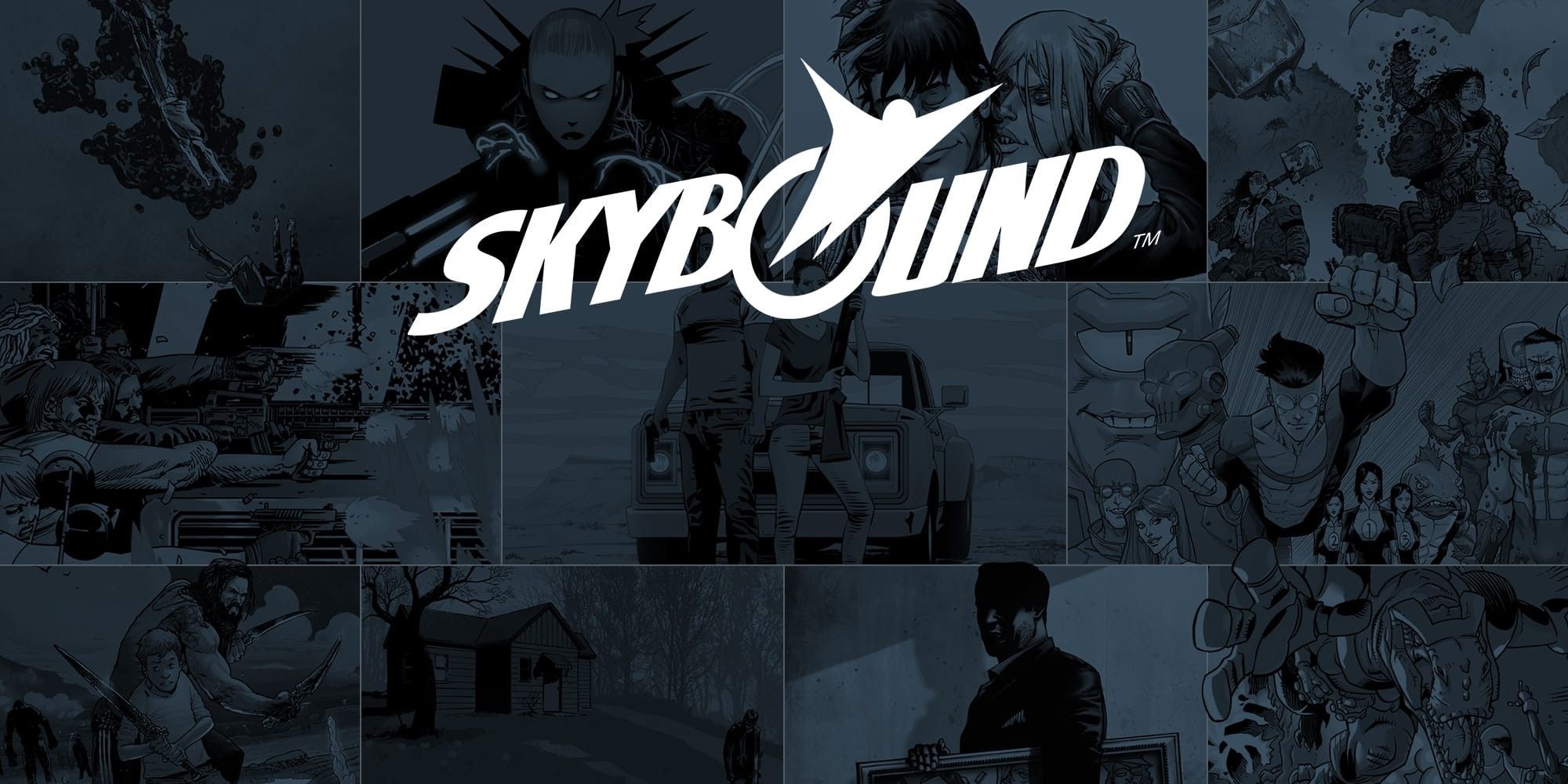
-(68).jpg)
